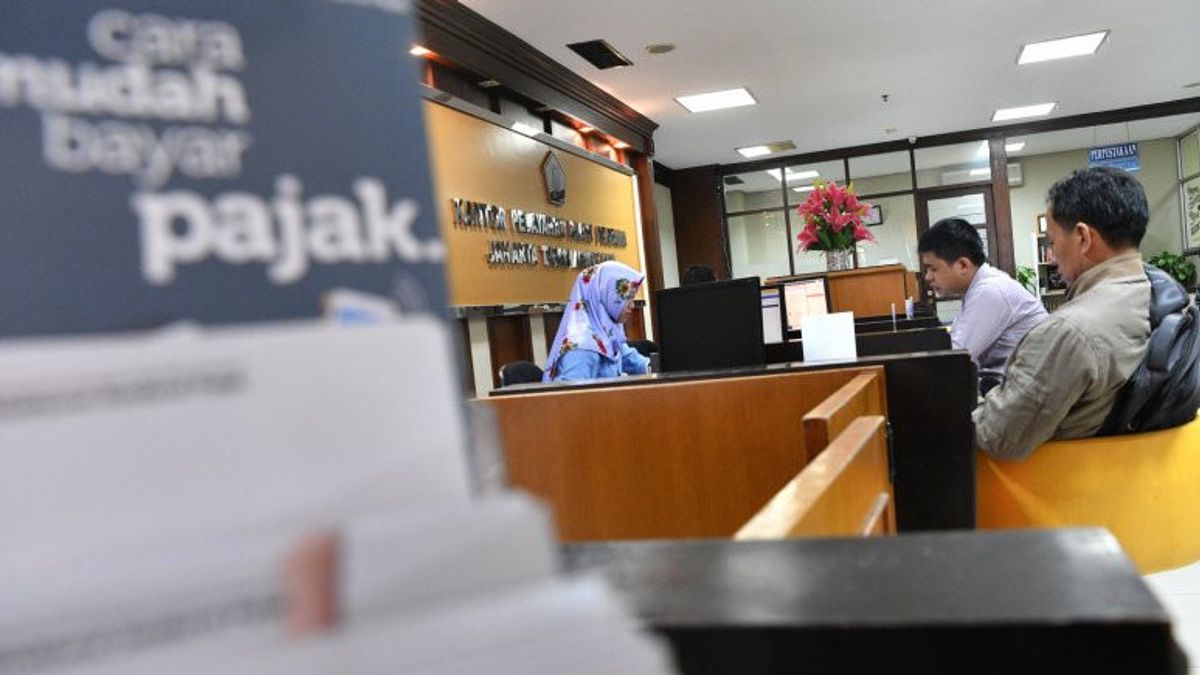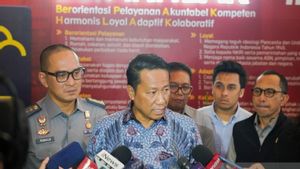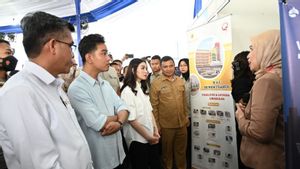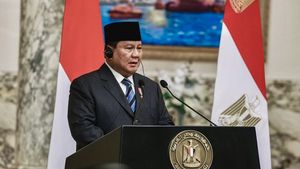JAKARTA Twitter social media this week has become a place for many people who are disappointed with tax workers at the Ministry of Finance. Fatimah Zahratunnisa on March 18 even shared her experience when she won an amateur singing competition in Japan in 2015.
Fatimah admitted that she had to negotiate first with the customs officers at Soekarno Hatta Airport, so that the trophy she got could reach home. Because the officer asked for the money he called a tax of Rp. 4.8 million
In fact, said Fatimah, the prize competition was only in the form of a trophy with no pocket money.
"Win a competition, how come it's a nombok. I don't accept it. Finally, I agree what the term is, it's complicated to need a lot of Lalala's letter which proves that it's a gift. Until showing the video, the TV program is also just a customs person to believe it. Where does the time at his office, DISURUH NYANyi, prove that she can sing or not," Fatimah said in her tweet.
Even though he believed, the customs officers still asked Fatimah for money.
"How much money do you have now? Can you pay how much?'. WAH KACAU EMOSI BGT is a gift yourself, have you been told to pay?! I said '5000 for the cost of going up to the angkot go home!'
Fatimah Zahratunnisa, the winner of the singing competition in Japan, shared on Twitter about the imposition of taxes for the trophy she managed to get. (Twitter)
This statement made Fatimah still stinging.
"Why is the 2015 story just telling the story now? Yes, I still have a grudge against BC (Bea Excise), I just want to nag because reading the thread about BC triggering emotions, or it's crowded. I want to follow Naon deui's opinion, this is the story of my own experience," added Fatimah.
Indonesian comic artists, including Dodit Mulyanto, also shared his experiences regarding tax fines.
"As a tax-abiding citizen, in 2016 I did not pay 184,331.70 and I have paid it off. Because at that time I was not educated, it turned out that the fine was 80,516,088. I have submitted a letter requesting a reduction / abolition of the fine, but it was rejected. Sorry the fine?" said Dodit in his Twitter account on March 20, 2023.
Responding to these various complaints, the Head of the Communication and Information Bureau of the Ministry of Finance, Yustinus Prastowo, through his Twitter account immediately responded.
"Representing the Ministry of Finance, we sincerely apologize for the inconvenience that happened. We really empathize and regret this incident. Our prayers Ms. Zahra (Fatimah) are getting more successful. We are committed to continuing to improve services," said Yustinus.
Yustinus has also confirmed that he will re-check the application for reduction/tax abolition that has been submitted by Dodit,
"Mas @Dodit_Mulyanto thank Pangapunten njih (Sorry). We are coordinating with @DitjenPajakRI's friends to check the application at that time. Thank you," he said.
Every item that enters Indonesia is considered as imported goods, so that import duties and import taxes are payable, including gifts. This refers to the Minister of Finance Regulation (PMK) Number 199/PMK.10/2019 concerning Customs, Excise and Tax Provisions on Imports of Goods sent.
If the comparative price data is the same as or lower than the free on board (FOB) of US$3, then the shipping goods will not be subject to import duties. However, if the comparative price data is higher, it will be subject to import duties.
The following provisions are as reported by Klikpajak, the import value is less than 3 US dollars per shipment, free of import duties but subject to an 11 percent Value Added Tax (VAT). The percentage of VAT is in accordance with the HPP Law which will take effect in April 2022.
The import value is more than 3 US dollars to 1500 US dollars per shipment, subject to import duties of 7.5 percent and VAT. Meanwhile, the import value is more than 1500 US dollars per shipment, subject to import duties, VAT, and Imported Taxes (PDRI)
The recipient of this shipment worth more than 1500 US dollars must submit a Goods Import Notification (PIB) to Customs and Excise to calculate the amount of tax that must be paid.
Meanwhile, artists and other art workers in tax regulations are classified as free work. Still from Klikpajak, the Income Tax (PPh) imposed refers to Article 21 paragraph (1) letter a of Law No. 36 of 2008 concerning Income Tax.
When an artist only earns income from a free job, the tax calculation uses a progressive tax rate in accordance with Article 17 paragraph 1 letter a in the regulation, namely:
5 percent for taxable income up to Rp50 million.15 percent for taxable income above Rp50 million-Rp250 million.25 percent for taxable income above Rp250 million-Rp500 million.30 percent for taxable income above Rp500 million.
To find out how much tax must be paid or PPh is owed, you must first look for the amount of Taxable Income which is multiplied by the progressive tax rate of Article 17 paragraph (1).
PPh can be paid by the employer or by the artist himself. If the stage honorarium has been cut first by the employer, the artist just needs to report it in the PPh Annual SPT by asking for proof of a tax cut first.
Likewise for PPh 23, income from royalties or rewards for the use of rights. If it has been deducted, the artist must ask for proof of withholding PPh 23 for tax SPT reporting documents.
In accordance with Article 23 paragraph (1) letter a, the PPh 23 tariff is 15 percent of the gross amount of dividends, interest, royalties, prizes, awards, bonuses, and the like. If you do not have NPWP, you will be charged a rate of 2 times the standard rate, which is 30 percent of the tax calculation basis.
Artists as taxpayers of individuals also have the right to a number of Non-Tax Income (PTKP). The amount of PTKP is still referring to the Regulation of the Minister of Finance (PMK) Number 101/PMK.010/2016 concerning Adjustments to PTKP.
As for administrative sanctions, it will be imposed on taxpayers who violate or do not follow the provisions of the Tax Law. Violations can be in the form of underpayment, forgetting to pay, not reporting taxes, and so on.
The previous sanctions did apply at a single rate as stipulated in the Taxation General Provisions Act. The fine for late paying taxes is 2 percent per month from the time the tax fee has not been paid.
Fines are calculated from the maturity date to the date of payment of taxes and if you are late in paying from the deadline, it will be calculated in full 1 month.
Now, along with changes in the Job Creation Law and the Tax Regulation Harmonization Law (HPP), tax administrative sanctions rates are dynamic. Following the provisions of interest rates, tax administration sanctions set by the Minister of Finance. The calculation determines the amount of sanctions referring to Bank Indonesia's interest rate.
Even so, taxpayers also have the right to apply for the abolition or reduction of tax sanctions to the Director General of Taxes. Of course with predetermined conditions.
The English, Chinese, Japanese, Arabic, and French versions are automatically generated by the AI. So there may still be inaccuracies in translating, please always see Indonesian as our main language. (system supported by DigitalSiber.id)










